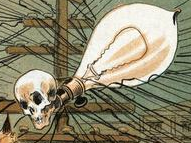I think the point is that the cover is never guaranteed to accurately represent the book.
Quality of cover =/= quality of book
Although, I’ll never buy a book where the author’s name is in bigger, bolder font than the title of the book.
I hate that trend in cover design and I refuse to support it.
Removed by mod
Is this still a thing? I thought this was mostly popular in the 90s and dropped out of popularity in the last couple decades.
Definitely still see it for Stephen King at least, but frankly I’d be creeped out if I saw his name small at this point…
Removed by mod
No. Some are richly designed to showcase the book contents and others are not. That’s the entire point! It’s not the books with fancy covers that are always the best. You could find a plain cover copy of The Hobbit in your local library next to another copy that is oversized with a gold-embossed cover and an amazing painting showing the party of 14 plus a Wizard huddled on a mountaintop against the storm…
…and they’re still the same book.
My copy of The Hobbit is really weird it’s just leather and says The Hobbit in gold inset writing.
Absolutely nothing on the back, or even a barcode.
Really old books tend not to have covered designs that seems to be a relatively modern phenomenon.
deleted by creator
The US covers of Harry Potter (yeah I know) are awful and a good example of the artist having differently not read the book.
deleted by creator
My go-to phrase now is , “don’t judge a book by its movie.”
It wasn’t when the idiom was coined. Have you seen hard-bound books from the 19th century in libraries?
didn’t most books look the same back then?
Removed by mod
I run Stable Diffusion on my computer, can you think of a relatively short novella to try this with? I have no idea what the limit for tokens is. To really “tech bro” it up we could feed it to an AI summarizer first.
This seems most appropriate just have it generate one for each short story.
Unless they’re “as seen in the hit TV show!” in which case it’s okay to tear those covers off.
It was very true for movies in the 80s. The cover would sometimes not have anything to do with the movie at all. Horror and sci-fi movies would show monsters that never appeared in the movie.
It’s not though. Books can, but don’t always, misrepresent themselves on the cover. Just like people.
It’s not saying that book covers always lie, it’s saying that you shouldn’t take everything at face value and you should think for yourself.
Whenever there’s a “don’t judge” statement, I always remember this post from Tyler The Creator.
Due to primal instincts, it’s inevitable that we judge. So judge, but don’t discriminate. Seems like a good system to me. ¯_(ツ)_/¯
Sounds like that uses a loaded connotation of the word discriminate. That word really just means to differentiate things from each other or discern distinct things.
I think a better way to say it would be: “judge, but don’t pre-judge.”
As long as you’re actually judging evidence in front of you, great. If you’re making shortcuts to judgments using superficial cues, that’s where you run into trouble.
That’s a good way of putting it.
I’m going to say it’s like a chicken and egg scenario.
It’s recommended that you don’t judge a thing or a person based on a quick glance. That’s good advice.
Book covers are designed specifically to be judged at a quick glance because they know that’s what people do, despite the advice they were given.
I think it’s also true in reverse. Like if the book cover looks really cool but the story is hot garbage.
I recently bought a book which spoke to me by its cover and it was one of the best books I’ve read in ages. And I still love the cover almost as I love the book.
But then there are books where I really disliked the cover but they are still great to have and full of useful information. (Most of these are non-fiction…)
I think the idiom misses the mark: judging is just one part of it. Being aware that lot of your judgments are going to be wrong, especially if you use only one source of information – that is much more useful thing to keep in mind.
However, adages are (like) memes—the best ones don’t always win.
I was told that the rest of the saying is “but it’s a good place to start.”










